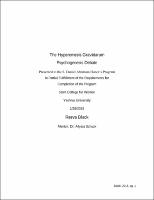Please use this identifier to cite or link to this item:
https://hdl.handle.net/20.500.12202/4200Full metadata record
| DC Field | Value | Language |
|---|---|---|
| dc.contributor.author | Black, Reeva | - |
| dc.date.accessioned | 2018-11-12T20:07:41Z | - |
| dc.date.available | 2018-11-12T20:07:41Z | - |
| dc.date.issued | 2018-01 | - |
| dc.identifier.uri | https://hdl.handle.net/20.500.12202/4200 | - |
| dc.identifier.uri | https://ezproxy.yu.edu/login?url=https://repository.yu.edu/handle/20.500.12202/4200 | |
| dc.description | The file is restricted for YU community access only. | - |
| dc.description.abstract | Nausea and vomiting during pregnancy is common, effecting up to 90% of pregnant women. It has taken on a diagnosis of its own, often referred to as NVP (Nausea Vomiting Pregnancy) condition. NVP usually lasts from before gestational week 9 through week 20 and the extent of symptoms ranges vastly between patients. Emesis Gravidarum (EG) is one condition of NVP. EG is commonly referred to as morning sickness (though it can be experienced at any time of day) and is defined as nausea during pregnancy, sometimes accompanied by vomiting. Most of the time, the effect on the patient is minimal; it can be self-limiting and restricting, but to a small extent1,2 . Hyperemesis Gravidarum (HG) is the most extreme form of NVP and is defined as pregnancy nausea that is “prolonged or severe.” This severity includes vomit episodes at least 3-5 times a day, an inability to take in food and/ or drink and at least 5% weight loss. Often, HG leads to dehydration from loss of fluid (causing exhaustion, drowsiness, and delirium), acidosis from lack of nutrition, and alkalosis (since ketones are lost through urination). Although NVP is extremely common, only 0.5-2% of the pregnant population experiences it to the extreme level of HG1,2. Despite the effected group being so small, HG is the most common cause of hospital admissions for women in their first trimester3 . Further, 2% of women who suffer from HG elect to terminate the pregnancy, and for those who do not take an abortion, negative fetal outcomes have been observed, like pre-term births, low birthweights, and fetal malformations4 . | en_US |
| dc.description.sponsorship | S. Daniel Abraham Honor’s Program | en_US |
| dc.language.iso | en_US | en_US |
| dc.publisher | Stern College for Women | en_US |
| dc.rights | Attribution-NonCommercial-NoDerivs 3.0 United States | * |
| dc.rights.uri | http://creativecommons.org/licenses/by-nc-nd/3.0/us/ | * |
| dc.subject | Morning sickness --Psychological aspects. | en_US |
| dc.subject | Gynecology --Psychosomatic aspects. | en_US |
| dc.title | The Hyperemesis Gravidarum Psychogenesis Debate | en_US |
| dc.type | Thesis | en_US |
| Appears in Collections: | S. Daniel Abraham Honors Student Theses | |
Files in This Item:
| File | Description | Size | Format | |
|---|---|---|---|---|
| Reeva Black.pdf Restricted Access | 341.83 kB | Adobe PDF |  View/Open |
This item is licensed under a Creative Commons License

